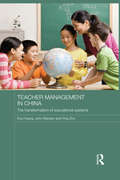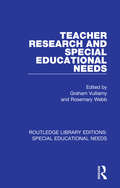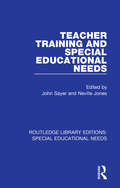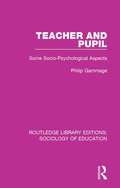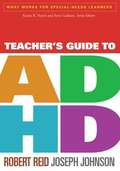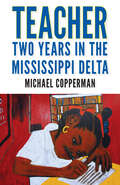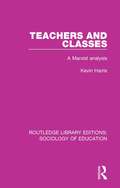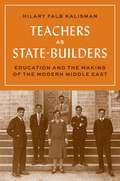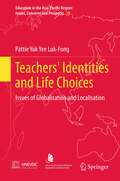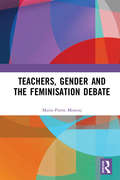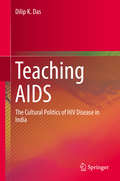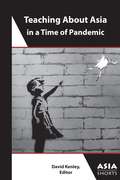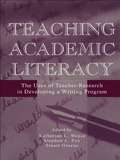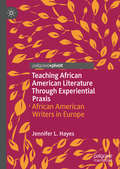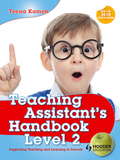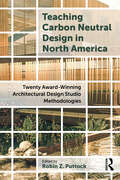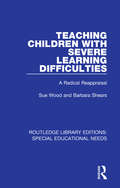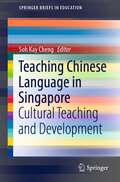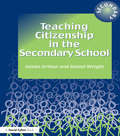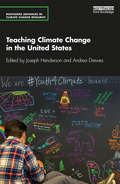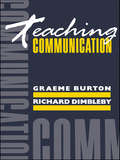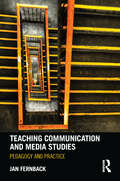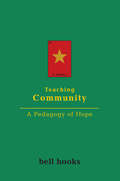- Table View
- List View
Teacher Management in China: The Transformation of Educational Systems (Routledge Contemporary China Series)
by John Benson Ying Zhu Eva HuangEducation has long been highly valued in China, and continues to be highly valued, both by the state, which appreciates the value of education for maintaining China's economic rise, and by parents, who, affected by the One Child Policy, devote a large proportion of their incomes to their one child's education. This book explores current systems of teacher management in China and assesses their effectiveness. It charts the development of China's education system, outlines present day human resource management methods in Chinese schools, including practices for recruitment and selection, training and development, performance appraisal, and rewards, both pay and non-financial rewards, and describes recent changes and innovations. The book concludes that a high performance work system, enhanced by traditional paternalistic humanised management and by pragmatism, predominates, with important consequences for teachers’ jobs and performance, and for the quality of students' school life.
Teacher Research and Special Education Needs (Routledge Library Editions: Special Educational Needs #58)
by Rosemary Webb Graham VulliamyFirst published in 1992. This book provides accounts of case-study research and evaluation in the area of special educational needs carried out by teachers in ordinary and special schools. Contributors discuss their experiences of the problems and possibilities of teacher research and provide advice on information-gathering, analysis and writing up. The findings presented address both whole-school matters, such as the use of support staff in ordinary schools, and the development of an assessment policy in a special school, and a range of current issues, such as partnership with parents and the teaching of children with emotional and behavioural difficulties. It is of interest to all teachers and tutors involved in research-based courses, students in primary and secondary initial teacher training, teachers on in-service courses, support staff for special educational needs.
Teacher Training and Special Educational Needs (Routledge Library Editions: Special Educational Needs #45)
by John Sayer and Neville JonesFirst published in 1985. The responses to special educational needs in the 1980s prompted radical changes in the initial and in-service education of teachers. This title is the result of a major conference which was called to anticipate the combined effects on training and special educational needs work and to project a spectrum of positive responses. The authors are drawn from all branches of education in order to provide a critical review of developments since 1983 in teacher-education and to discuss the current recommendations on training to meet special educational needs both in Great Britain and the rest of Europe.
Teacher and Pupil: Some Socio-Psychological Aspects (Routledge Library Editions: Sociology of Education #26)
by Philip GammageThis title, first published in 1971, provides a guide to the social psychology of learning. The author examines the school class as a group and considers the formation of some of the attitudes of the children and the teacher as they relate to education. Building upon interaction as a major theme, the study focuses attention on the ways in which relationships can affect the classroom climate. The background to group dynamics leads to the elements of sociometry and to consideration of teaching styles, communication structure and perceptions of the teacher’s role. This title will be of interest to students of sociology and education.
Teacher's Guide to ADHD
by Joseph Johnson Robert ReidMeeting a key need for teachers, this book provides practical, data-based tools for helping students with attention-deficit/hyperactivity disorder (ADHD) succeed in the classroom. The authors combine instructional expertise with extensive knowledge about the nature and treatment of ADHD. Coverage includes ways to support students and teach them needed strategies in core areas: academic skills, behavior, self-regulation, and social skills. Step-by-step instructions and concrete examples help teachers implement effective interventions and accommodations. The book also offers crucial guidance for teaming with other school professionals and with parents.
Teacher: Two Years in the Mississippi Delta
by Michael CoppermanWhen Michael Copperman left Stanford University for the Mississippi Delta in 2002, he imagined he would lift underprivileged children from the narrow horizons of rural poverty. Well-meaning but naïve, the Asian American from the West Coast soon lost his bearings in a world divided between black and white. He had no idea how to manage a classroom or help children navigate the considerable challenges they faced. In trying to help students, he often found he couldn't afford to give what they required--sometimes with heartbreaking consequences. His desperate efforts to save child after child were misguided but sincere. He offered children the best invitations to success he could manage. But he still felt like an outsider who was failing the children and himself.Teach For America has for a decade been the nation's largest employer of recent college graduates but has come under increasing criticism in recent years even as it has grown exponentially. This memoir considers the distance between the idealism of the organization's creed that "One day, all children in this nation will have the opportunity to attain an excellent education and reach their full potential" and what it actually means to teach in America's poorest and most troubled public schools.Copperman's memoir vividly captures his disorientation in the divided world of the Delta, even as the author marvels at the wit and resilience of the children in his classroom. To them, he is at once an authority figure and a stranger minority than even they are--a lone Asian, an outsider among outsiders. His journey is of great relevance to teachers, administrators, and parents longing for quality education in America. His frank story shows that the solutions for impoverished schools are far from simple.
Teachers and Classes: A Marxist analysis (Routledge Library Editions: Sociology of Education #28)
by Kevin HarrisIn this study, first published in 1982, the author draws on his considerable experience at all levels in the school system to present a radical Marxist critique of that structure. He argues that the schooling process within contemporary corporate capitalism is inimical to education, while true education in turn is inimical to capitalism. He argues further that teachers, who are participants in ongoing class struggle, can begin to be concerned primarily with education only when they perform the function of the collective labourer. This title will be of interest to students of education and sociology.
Teachers and the Epistemology of History: .
by Henrik Åström Elmersjö Paul ZanazanianThis edited book explores conceptual as well as empirical approaches to epistemic beliefs that teachers of history might hold. In many parts of the world, history teachers are tasked with both upholding historical national myths and at the same time giving students the tools needed to deconstruct history and think critically. This ambiguity embedded in the combination of reconstruction and deconstruction is a difficult landscape for teachers to navigate. The chapters of this book therefore explore how teachers reason regarding the epistemic nature of history and how this impacts their teaching, interpretation of curricula and relationship to their students. Contributions consider the implications for prospective history teachers and in-service training, challenges to the field and point to ways forward. The book will be of interest to academics and students of history education, as well as practising teachers and museum curators. This is an open access book.
Teachers as State-Builders: Education and the Making of the Modern Middle East
by Hilary Falb KalismanThe little-known history of public school teachers across the Arab world—and how they wielded an unlikely influence over the modern Middle EastToday, it is hard to imagine a time and place when public school teachers were considered among the elite strata of society. But in the lands controlled by the Ottomans, and then by the British in the early and mid-twentieth century, teachers were key players in government and leading formulators of ideologies. Drawing on archival research and oral histories, Teachers as State-Builders brings to light educators’ outsized role in shaping the politics of the modern Middle East.Hilary Falb Kalisman tells the story of the few young Arab men—and fewer young Arab women—who were lucky enough to teach public school in the territories that became Iraq, Jordan, and Palestine/Israel. Crossing Ottoman provincial and, later, Mandate and national borders for work and study, these educators were advantageously positioned to assume mid- and even high-level administrative positions in multiple government bureaucracies. All told, over one-third of the prime ministers who served in Iraq from the 1950s through the 1960s, and in Jordan from the 1940s through the early 1970s, were former public school teachers—a trend that changed only when independence, occupation, and mass education degraded the status of teaching.The first history of education across Britain’s Middle Eastern Mandates, this transnational study reframes our understanding of the profession of teaching, the connections between public education and nationalism, and the fluid politics of the interwar Middle East.
Teachers' Identities and Life Choices
by Pattie Luk-FongThis book discusses issues related to teachers' identities and life choices when globalisation and localisation are enmeshed. It examines how competing cultural traditions and contexts acted as resources or/and constraints in framing teachers' identities and their negotiations in the family and the work domains according to their gender positioning, their roles in the family such as husband, wife, father, mother, brother, sister, son and daughter and roles in the school such as principal, senior teacher or regular teacher. Contrary to an essentialist approach to identity and culture, teachers' stories show that their identities and life choices were hardly free choices; but were often part and parcel of the culture and contexts in which they were embedded. Teachers' identities are found to be fluid, complex, hybrid and multifaceted. Using Hong Kong as a case study, this book provides not only traces of the continuity and changes of Confucian self and cardinal relationships but also a glimpse of how educational reform as neo-capitalist discourses in the workplace interacts with Confucian cultural traditions creating new hybrid practices (problems or possibilities or both) in the school and in the daily lives of teachers.
Teachers, Gender and the Feminisation Debate
by Marie-Pierre MoreauTeachers, Gender and the Feminisation Debate critically engages with the claim that teaching is a feminised profession and offers a comprehensive and authoritative analysis of the way gender and power play out in the lives of male and female teachers. Informed by social constructivist, feminist theories of work and education, the book adopts a relational and intersectional approach to gender. Drawing on a range of primary and secondary sources, including national and international datasets, policy and research texts, and an original corpus of interviews conducted by the author in England and France, the book provides a timely assessment of a view of teaching as feminised. It explores the various discourses and debates about the feminisation of teaching which circulate in media and policy circles in a range of local, national and international contexts, and questions some of the claims underpinning these discourses. It also analyses the experiences of men and women who teach, looking at the way gender and power impact on their careers and private lives in the context of the feminisation debate. Teachers, Gender and the Feminisation Debate offers a research-informed and comprehensive account of gender issues in the teaching profession and will be of great interest to academics, researchers and postgraduate students in the fields of education, sociology and gender studies.
Teaching AIDS: The Cultural Politics of HIV Disease in India
by Dilip K. DasThis book approaches the subject of AIDS pedagogy by analysing the complex links between representation or discourse, ideology, power relations and practices of self, understood from the perspective of embodiment. While there is a fairly large amount of literature available on the social, economic, psychological and policy dimensions of the epidemic, there is virtually nothing on its cultural politics. As a critique of the national AIDS pedagogy, this book attempts to fill the gap. It addresses important issues in cultural studies, body studies, medical humanities, disease control policy and behaviour change communication strategies. This book will be of interest to researchers and students of culture studies and social sciences, especially social anthropology, community health, health management. and gender studies.
Teaching About Asia in a Time of Pandemic (Asia Shorts)
by David KenleyIn the spring of 2020, educators suddenly found themselves teaching remotely as they and their students began a multiweek period of pandemic-induced isolation. As weeks turned to months, administrators announced that students would not return to campus until the following school year and perhaps even longer. Teachers quickly scrambled to design new pedagogical approaches suitable to a socially-distanced education.Teaching About Asia in a Time of Pandemic presents many lessons learned by educators during the COVID-19 outbreak. The volume consists of two sections. Section one includes chapters discussing how to teach Asian history, politics, culture, and society using examples and case studies emerging from the pandemic. Section two focuses on the pedagogical tools and methods that teachers can employ to teach Asian topics beyond the traditional face-to-face classroom. Both sections are designed for undergraduate instructors as well as high school teachers using prose that is easily accessible for non-specialists. The volume is a collaborative work between the AAS Asia Shorts series and the AAS pedagogical journal Education about Asia, exemplifying the high standards of both publishing ventures.
Teaching Academic Literacy: The Uses of Teacher-research in Developing A Writing Program
by Stuart Greene Katherine L. Weese Stephen L. FoxTeaching Academic Literacy provides a unique outlook on a first-year writing program's evolution by bringing together a group of related essays that analyze, from various angles, how theoretical concepts about writing actually operate in real students' writing. Based on the beginning writing program developed at the University of Wisconsin-Madison, a course that asks students to consider what it means to be a literate member of a community, the essays in the collection explore how students become (and what impedes their progress in becoming) authorities in writing situations. Key features of this volume include: * demonstrations of how research into specific teaching problems (e.g., the problem of authority in beginning writers' work) can be conducted by examining student work through a variety of lenses such as task interpretation, collaboration, and conference, so that instructors can understand what factors influence students, and can then use what they have learned to reshape their teaching practices; * adaptability of theory and research to develop a course that engages basic writers with challenging ideas; * a model of how a large writing program can be administered, particularly in regards to the integration of research and curriculum development; and * integration of literary and composition theories.
Teaching African American Literature Through Experiential Praxis: African American Writers in Europe
by Jennifer L. HayesThis book focuses on teaching African American literature through experiential praxis. Specifically, the book presents several canonical African American literature authors in a study abroad context. The book chapters consider the historical implications of travel within the African American literature tradition including slave narratives, migration narratives, and expatriate narratives. The book foregrounds this tradition and includes activities, rhetorical prompts, and thematic discussion that support instruction.
Teaching Assistant's Handbook for Level 2: Supporting Teaching and Learning in Schools
by Teena KamenThis textbook will be the perfect companion to you if you are taking a qualification in Supporting Teaching and Learning in Schools at level 2, whether that is the Award in Support Work in Schools, Certificate in Supporting Teaching and Learning in Schools, or Certificate in Supporting the Wider Curriculum.Teaching Assistant's Handbook for Level 2, offers you a comprehensive and practical guide to supporting the development of children and young people in a variety of educational settings, including primary, secondary and special schools as well as extended schools. The tasks included will develop your personal and professional skill as well as key tasks which will contribute to your assesment.This new edition in updated in line with the revisions made to the specification following the implementation of the Qualifications and Curriculum Framework in 2010, and now mirrors the structure of the units that make up the various Level 2 qualifications.
Teaching Carbon Neutral Design in North America: Twenty Award-Winning Architectural Design Studio Methodologies
by Robin Z. PuttockThis book brings to light a diverse range of innovative architectural design studio methodologies formulated to educate future graduates to combat the climate crisis through carbon neutral design.Award-winning professors detail tried-and-tested studio methodologies, outlining their philosophical rationale, the role of precedent study, design concept and professional partnerships, the approach to analytics and software design development, required readings, assignment and student work examples, and anticipated future innovation. Chapters are grouped under varying focal points including community empowerment, bioclimatic response, performance analytics, design build, and urban scale, all adopting a holistic view of sustainable design that incorporates technical challenges as well as those of equity and social justice.This heterogeneous compilation of strategies encourages wide accessibility to and acceptance by studio professors, as well as administrators and faculty developing architecture curricula. This will, in turn, maximize the impact on curtailing carbon emissions resulting from the construction and operations of our built environment.
Teaching Children with Severe Learning Difficulties: A Radical Reappraisal (Routledge Library Editions: Special Educational Needs #61)
by Sue Wood Barbara ShearsFirst published in 1986. The teaching of children with severe learning difficulties had received little coherent critical analysis. Long-held assumptions and implicit beliefs were embedded in curriculum content and teaching methodology, thus creating and maintaining handicapping conditions. This book raises questions about underlying value judgments relating to the status and rights afforded to children with severe learning difficulties and the implications for education and teaching. Possibilities for change are discussed in relation to the curriculum, the content of the educational programme and the teacher-pupil relationship.
Teaching Chinese Language in Singapore: Cultural Teaching and Development (SpringerBriefs in Education)
by Soh Kay ChengThis book is cast in a Singaporean context in which Chinese Language is taught as a second language with an emphasis on communicational skills. It showcases ideas on including cultural teaching to enhance second language learning for more effective outcomes. As a collection of chapters relevant to cultural teaching, the book seeks to enthuse Chinese Language educators to incorporate elements of Chinese culture into their lessons. It is practice-oriented and provides examples using Chinese language textbooks, with suggestions for post-lesson activities. It also documents and discusses the needed developments of Singapore's Chinese culture with references to the three popular co-curricular activities of Chinese music, drama (crosstalk), and dance in schools.
Teaching Citizenship in the Secondary School
by James Arthur Daniel WrightThis text supports student teachers, NQTs and practitioners in implementing the Citizenship Order in secondary schools - to be introduced in September 2002. With a practical, clear focus, the authors provide an intellectual challenge; argument and evidence to help the reader come to an informed view on the complex and controversial issues in each chapter; well-focused examples; and strategies for use in the classroom.
Teaching Climate Change in the United States (Routledge Advances in Climate Change Research)
by Joseph Henderson Andrea DrewesThis book highlights best practices in climate change education through the analysis of a rich collection of case studies that showcase educational programs across the United States. Framed against the political backdrop of a country in which climate change denial presents a significant threat to global action for mitigation and adaptation, each case study examines the various strategies employed by those working in this increasingly challenging sociopolitical environment. Via co-authored chapters written by educational researchers and climate change education practitioners in conversation with one another, a wide range of education programs is represented. These range from traditional institutions such as K-12 schools and universities to the contemporary learning environments of museums and environmental education centres. The role of mass media and community-level educational initiatives is also examined. The authors cover a multitude of topics, including the challenge of multi-stakeholder projects, tensions between indigenous knowledge and scientific research, education for youth activism, and professional learning. By telling stories of success and failure from the field, this book provides climate change researchers and educators with tools to help them navigate increasingly rough and rising waters.
Teaching Communication
by Graeme Burton Richard DimblebyWe learn most of our communication skills without consciously working at them. Teaching Communication sets out what those skills are and how to develop them.
Teaching Communication and Media Studies: Pedagogy and Practice
by Jan FernbackDesigned for communication/media educators and graduate students, Teaching Communication and Media Studies is a practical and conceptual guide to teaching university courses in communication and media studies. Relying on her extensive experience instructing graduate students on the ins and outs of teaching, Jan Fernback discusses theoretical and applied topics central to contemporary mediated communication instruction, offering instructors at all levels strategies they can use to create a successful classroom experience. Fernback also considers the logic, design and delivery of courses in communication and media studies, while encouraging readers to reflect on their own strategic pedagogical decisions. Supplemented with interviews of successful communication instructors and sample exercises, this book is a must-have resource for all those teaching communication and media studies courses, regardless of level of experience.
Teaching Communication: Theory, Research, and Methods
by Gustav W. Friedrich Anita L. Vangelisti John A. DalyThe field of communication was founded, in part, because of a need to make people better communicators. That meant teaching them how to communicate more effectively, whether it be in public settings or in private. Most of that teaching has happened within the classroom and many professionals have spent their lives instructing others on various aspects of communication. Inside this second edition, the editors have assembled a fully comprehensive and contemporary discussion of topics and issues concerning the teaching of communication. The chapters contained herein--contributed by key voices throughout the communication discipline--address conceptual as well as practical issues related to communication instruction. The contents of this new edition reflect the dramatic changes that have occurred in communication education since the publication of the first edition in 1990. This book focuses initially on the goals of communication education, then delves into the preparation of specific communication courses. It includes assistance for instructors in organizing instructional content and discusses the use of instructional strategies and tools, as well as offering ideas on evaluating the processes and products of instruction. The volume also covers unique teaching assignments that may be encountered, from the basic course to continuing education, and addresses 2-year college teaching, directing forensic programs, distance education, and consulting. It concludes with important professional issues faced by both new and experienced communication instructors, including ethics and political issues within classrooms and departments. This volume is a necessity for anyone starting out a career as a communication instructor. Veteran educators--who know that learning to teach is a continual growth experience--will find useful and invaluable information within the book's pages. Whatever background and level of experience, all communication educators will find this new edition to be an essential resource for their work.
Teaching Community: A Pedagogy of Hope
by bell hooksTen years ago, bell hooks astonished readers with Teaching to Transgress: Education as the Practice of Freedom. Now comes Teaching Community: A Pedagogy of Hope - a powerful, visionary work that will enrich our teaching and our lives. Combining critical thinking about education with autobiographical narratives, hooks invites readers to extend the discourse of race, gender, class and nationality beyond the classroom into everyday situations of learning. bell hooks writes candidly about her own experiences. Teaching, she explains, can happen anywhere, any time - not just in college classrooms but in churches, in bookstores, in homes where people get together to share ideas that affect their daily lives. In Teaching Community bell hooks seeks to theorize from the place of the positive, looking at what works. Writing about struggles to end racism and white supremacy, she makes the useful point that "No one is born a racist. Everyone makes a choice." Teaching Community tells us how we can choose to end racism and create a beloved community. hooks looks at many issues-among them, spirituality in the classroom, white people looking to end racism, and erotic relationships between professors and students. Spirit, struggle, service, love, the ideals of shared knowledge and shared learning - these values motivate progressive social change. Teachers of vision know that democratic education can never be confined to a classroom. Teaching - so often undervalued in our society -- can be a joyous and inclusive activity. bell hooks shows the way. "When teachers teach with love, combining care, commitment, knowledge, responsibility, respect, and trust, we are often able to enter the classroom and go straight to the heart of the matter, which is knowing what to do on any given day to create the best climate for learning."
